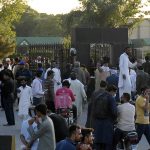
The sudden arrest of Imran Khan by Pakistan military has come as the final straw for the people who were at the receiving end of fundamentalism, terrorism, and a collapsing economy. Thousands of irate mob vandalized public properties and expressed their frustration against the country’s ruling elite, including the defence forces. The charges against Imran Khan, a popular leader who has been stoking his street fight with regular rallies and protests, are not grave ones. Corruption charges against people in power can often be motivated and difficult to prove.
In this light, the arrest of Pakistan Tehreek-e-Insaf (PTI) chief and former Prime Minister Imran Khan can both be necessary and unnecessary. If the country follows the rule of law in strictest manner, well his arrest could be normal, as would his release be. But that doesn’t seem to be the case. On the ground, Pakistan is ruled by the establishment and mobs.
In the latest, the government has arrested several PTI party leaders, including former Prime Minister Imran Khan’s close aide Shah Mahmood Qureshi, as protests continue across the country. The arrest is based on charges of corruption and misuse of authority. The arrest has been met with mixed responses, with some applauding the action as a step towards accountability and others criticising it as politically motivated.
The arrests come amid ongoing political turmoil, economic instability, and security concerns in Pakistan.
The protests began after the government arrested Imran Khan on corruption charges, sparking widespread outrage and calls for his release. The PTI has denied the charges against Khan and has accused the government of political persecution.
The arrests of Qureshi and other party leaders have further inflamed tensions, with many supporters taking to the streets to demand their release. The government has responded by imposing a curfew in several cities and using force to disperse protesters.
This comes after Khan’s assassination attempt sometime back. The incident occurred while Khan was on his way to a political rally in Lahore, where he was scheduled to speak. According to reports, a man opened fire on Khan’s convoy, injuring security personnel.
In his address to the nation, Khan thanked his security personnel for their bravery and dedication and expressed his gratitude to the people of Pakistan for their support and prayers. He also called on the government to improve security in the country and bring the attack’s perpetrators to justice. Khan’s assassination attempt came at a time of political turmoil in Pakistan.
The country is currently amid a power struggle between Khan’s Pakistan Tehreek-e-Insaf (PTI) party and the opposition Pakistan Muslim League-Nawaz (PML-N) party, led by former Prime Minister Nawaz Sharif. The two parties have been in a bitter political battle since Khan’s election in 2018, with accusations of corruption and electoral fraud being thrown around by both sides.
The assassination attempt on Khan has been condemned by leaders worldwide, including Indian Prime Minister Narendra Modi. In a tweet, Modi expressed his shock and concern over the incident and called for a united effort to combat terrorism.
A 2009 tweet by Indian Prime Minister Narendra Modi on Pakistan went viral on social media. In the tweet, Modi expressed his concern over the deteriorating security situation in Pakistan and called for a united effort to combat terrorism.
The tweet, posted on November 26, 2009, reads: “Disturbing news from Pakistan. My consolations to the families of those who lost their lives in the terrorist raid in Lahore. We must stand united against terrorism.”
The situation in Pakistan remains tense, with many calling for calm and a peaceful resolution to the crisis. Pakistan faces high inflation, a significant debt burden, and unemployment. The ongoing political turmoil and security concerns have further compounded these issues, making it difficult for the government to address them effectively.
Pakistan needs strong and stable leadership and a commitment to reform and good governance to address these issues and create a brighter future for its people. This will require a focus on education and job creation, as well as efforts to tackle corruption and improve security.
In conclusion, with ongoing protests and arrests highlighting the challenges facing the country, Pakistan needs strong and stable leadership and a commitment to reform and good governance to build a brighter future. The international community must also continue to engage with Pakistan, support its efforts to address these challenges and create a more and prosperous future for its people. (IPA Service)
The post Imran Khan’s Arrest Shows The Rule Of Law Is Selective In Pakistan first appeared on IPA Newspack.


